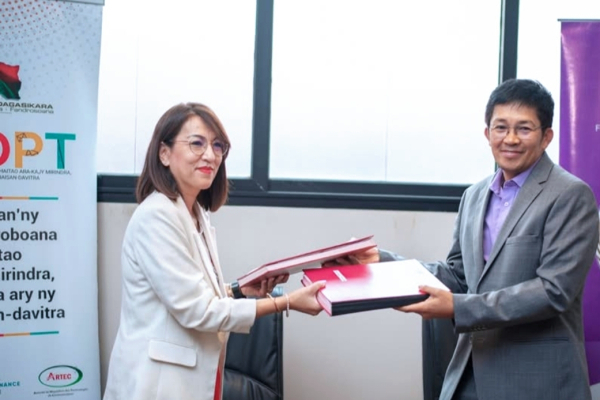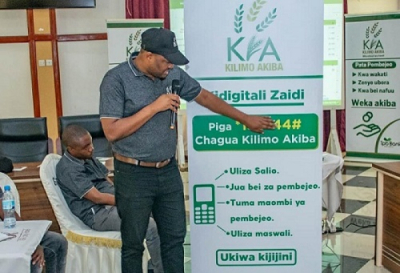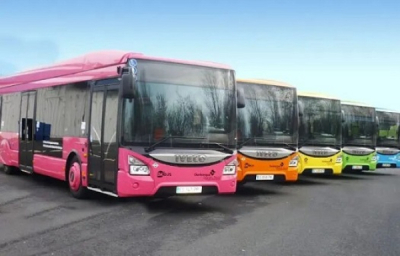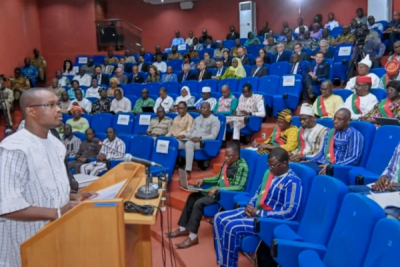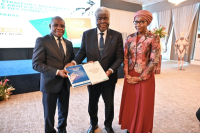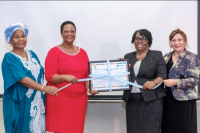Madagascar aims to accelerate its digital transformation, making it a key economic driver across all sectors, including healthcare.
The Malagasy government launched a hospital digitalization project, with the Ministry of Public Health and the Ministry of Digital Development, Posts, and Telecommunications (MDNPT) signing a partnership agreement on Friday, March 14.
The project aims to improve governance and transparency in public hospitals and increase access to healthcare.
"Several stages are planned in this project, but optimizing the patient journey and improving patient care have been identified as priorities, as they have a direct impact on the daily lives of the Malagasy population," the MDNPT said in a Facebook statement. Minister of Public Health Zely Arivelony Randriamanantany said digital tools and systems would improve patient management and financial transaction monitoring.
The initiative aligns with Madagascar's 2023-2028 Five-Year Strategic Digital Plan, which seeks to position the country as a key player in Africa's digital economy. In the healthcare sector, the government aims to invest in human capital, improve governance, increase access to care, and strengthen public confidence in the national health system.
The World Health Organization (WHO) said the program could enhance healthcare services and optimize decision-making through real-time data collection, storage, and analysis. In its 2024 report, "Health Data Digitalization in Africa: Unlocking the Potential," the WHO stated, "This data-driven approach helps healthcare professionals choose appropriate treatments and supports policymakers in developing impactful health policies."
By Isaac K. Kassouwi,
Editing by Sèna D. B. de Sodji
In Africa, digital transformation is accelerating the rise of innovative startups that leverage technology to meet the needs of local populations. However, these young companies face several challenges.
Angola's National Institute for the Support of Small and Medium-Sized Enterprises (INAPEM) and the National Institute for the Promotion of the Information Society (INFOSI) signed a memorandum of understanding on Friday, March 14, to support startup development.
The agreement aims to establish a collaborative framework to bolster INFOSI's DIGITAL.AO incubation program, with both agencies committing to joint actions to assist Angolan startups and digital entrepreneurs, fostering innovation. INAPEM will provide institutional and technical support to DIGITAL.AO.
"The objectives of the partnership include identifying and selecting startups and entrepreneurs participating in the program, providing physical incubation spaces, organizing training sessions and capacity-building workshops, offering mentorship and specialized consulting services, and facilitating access to investor networks and potential partners," INAPEM said in a statement.
An International Finance Corporation (IFC) "Assessment of the Angolan Startup Ecosystem," published in November 2023, found the ecosystem is in its nascent stage, characterized by a low number of startups, approximately 125, and resource limitations. The IFC noted no Angolan startup has yet achieved an exit event.
The IFC believes supporting startups, innovation, and entrepreneurship can diversify Angola's oil-dependent economy and create jobs, particularly for youth and women.
However, the IFC recommends Angolan authorities prioritize a startup law to improve the policy environment for young enterprises across multiple areas. This includes strengthening early-stage financing by direct government involvement in creating, investing in, and maintaining startup funding mechanisms. The financial institution also emphasizes integrating entrepreneurship, digital skills, and coding into the national education system, and establishing more vocational training schools to enhance the talent pool.
By Isaac K. Kassouwi,
Editing by Sèna D. B. de Sodji
As digital innovation gradually transforms Africa’s agricultural sector, Kilimo Bando is emerging as an appealing option for Tanzanian farmers.
Bizy Tech, a Tanzanian startup founded in 2015 by Mahmoud Shoo, has developed Kilimo Bando, an agritech solution aimed at improving resource and market access for local farms, thereby boosting productivity and profitability.
The Dar es Salaam-based company designed the service to address key challenges faced by Tanzanian farmers, including limited access to quality inputs, financing, and market opportunities. Its mobile application, currently available only on Android, has been downloaded over a hundred times, according to Play Store data. An intuitive interface allows users to connect directly with certified seed and fertilizer suppliers.
"We identified inefficiencies in access to quality inputs, timely financing, and reliable market linkages for over nine million smallholder farmers in Tanzania. Current solutions lack integration and scalability, making our platform uniquely positioned to fill this gap," said Rahim Shoo, head of product development and business operations at the startup.
Kilimo Bando integrates secure digital payment solutions, facilitating transactions and strengthening financial inclusion for farmers. It also offers several additional features, including Kilimo Akiba, which helps users save within the formal banking system to finance essential services during planting seasons.
Kilimo Bima is an insurance service covering crops, health, life, and equipment, with a particular focus on protecting harvests from disasters or other production disruptions. Kilimo Mkopo provides farmers with loans to invest in and enhance their productivity. Meanwhile, Kilimo Bora trains small-scale farmers in agronomy and soil management to improve crop quality. Kilimo Bando also offers real-time information on weather conditions and best agricultural practices.
The startup claims more than four million registered farmers and over 5,600 merchants. By integrating digital tools into the agricultural value chain, it is helping to modernize Tanzanian agriculture, promote the adoption of sustainable practices, and improve farmers’ resilience to climate and economic challenges.
By Adoni Conrad Quenum,
Editing by Feriol Bewa
Algeria plans for artificial intelligence to contribute 7% to its GDP by 2027, with investments in advanced infrastructure driving this goal.
Minister of Post and Telecommunications Sid Ali Zerrouki laid the foundation stone Sunday, March 16, for Algeria’s inaugural high-performance computing center dedicated to artificial intelligence in Oran. This infrastructure, deemed a strategic move toward digital sovereignty, aims to provide the country with the intensive computing capacity essential for AI technology development.
During his address, the minister said the center aligns with President Abdelmadjid Tebboune’s vision to position Algeria as a leading player in innovation and digital technology across Africa. He highlighted the opportunities this infrastructure will offer researchers, startups, and academic institutions by granting access to advanced technological resources. Equipped with latest-generation graphics processing units (GPUs), the center will provide the necessary power for developing strategic applications in fields such as healthcare, industry, cybersecurity, and smart cities.
This project is part of the recently unveiled national AI strategy, which focuses on several key areas, including strengthening computing infrastructure with data centers and optimized cloud solutions, developing education and research in collaboration with universities and specialized centers, and promoting industrial applications to support startups and businesses in designing AI-based solutions.
With this center, Algeria takes a significant step toward technological autonomy. High-performance computing plays a vital role in optimizing AI models and simulating complex systems in critical sectors such as precision agriculture, energy resource management, and climate modeling. By providing direct access to these advanced computing capabilities, the country reduces its reliance on foreign infrastructure and lowers outsourcing costs. This project contributes to strengthening Algeria’s technological independence while fostering innovation in strategic sectors.
Upon completion, this center is expected to enhance Algeria’s high-performance computing capabilities and accelerate the development of AI applications in key sectors such as precision agriculture, energy resource management, and climate modeling. It will offer local researchers and businesses the opportunity to access advanced technological resources, thereby reducing dependence on foreign infrastructure. This initiative could play a key role in the emergence of a dynamic and competitive AI ecosystem in North Africa.
By Samira Njoya,
Editing by Sèna D. B. de Sodji
In Fang, one of Gabon’s lingua francas, Ekena means travel. It points to the startup’s mission of simplifying travel procedures within Gabon for locals and foreign tourists.
Ekena is a Gabonese web application launched in 2022 to simplify domestic travel by offering online ticket purchases for boat, train, and road transportation, according to its founders, Teddy Mba Edou and Vilia Mbinda Moussadji.
The Libreville-based startup aims to alleviate the challenges faced by working professionals who previously had to interrupt their schedules to buy tickets in person. "This application was created because we made an observation: in Gabon, it is very difficult for professionals and active individuals to constantly put their activities on hold to physically go to an agency to buy a transport ticket," Teddy Mba Edou told We Are Tech Africa.
Ekena’s user-friendly platform allows travelers to input their desired travel details into a search form, select their preferred travel option, provide necessary information, and complete payment via PayPal, mobile money, or bank transfer. The service also provides detailed information on the products and services offered by various partner transportation companies.
Upon successful transaction, users receive an email with a download link for their tickets, which can be printed or stored on a mobile device. Notably, Ekena does not require prior user registration.
The platform currently allows the purchase of up to five tickets per transaction, which may present a limitation for larger groups. However, with ongoing enhancements and adaptations to user feedback, Ekena is poised to become a significant player in Gabon’s mobility sector.
By Adoni Conrad Quenum,
Editing by Feriol Bewa
Like many African countries, the Burkinabe government views digital technology as a key driver of socio-economic development. It is focusing on connecting public administrations to improve services for citizens.
The Burkinabe government has invested over 18 billion CFA francs ($30 million) in developing digital infrastructure, Prime Minister Rimtalba Jean Emmanuel Ouédraogo told the Transitional Legislative Assembly on Friday, March 14, citing significant progress in the telecommunications sector.
Ouédraogo said the state allocated more than 3 billion CFA francs to assist operators in restoring networks in areas previously destabilized by insecurity. This funding enabled the expansion of electronic communication networks to 44 new localities in underserved regions, improving internet and telecommunications service access.
On the administrative front, 104 new buildings were connected to the National Public Administration Information Network (RESINA), bringing the total number of interconnected public buildings to 2,947. To bolster digital sovereignty and strengthen national capacity, the government initiated the construction of two mini data centers, representing an investment exceeding 15 billion CFA francs.
Between 2023 and 2024, 169 administrative procedure platforms were digitized, with 77 currently operational and 92 in the deployment phase. These efforts are part of a broader strategy to position Burkina Faso as a key player in information and communication technology (ICT) integration in West Africa.
Despite these advances, Burkina Faso faces substantial challenges. According to the International Telecommunication Union’s (ITU) “Measuring Digital Development – ICT Development Index 2024,” published in June 2024, Burkina Faso ranks 43rd out of 47 African countries in ICT development, with a score of 30.1 out of 100.
Upon completion, these investments will significantly enhance Burkina Faso’s access to digital services and strengthen its technological autonomy. This, officials say, will establish a foundation for a more efficient and inclusive digital ecosystem, aligning with the nation’s modernization and socio-economic development goals.
By Samira Njoya,
Editing by Sèna D. B. de Sodji
AI presents Africa with a major opportunity to overcome its development challenges through innovative solutions. Countries like Côte d'Ivoire, among the most forward-thinking, are implementing strategic initiatives to leverage this emerging technology.
Côte d'Ivoire presented its national strategy for artificial intelligence (AI) and data governance on Thursday, March 13. After eight months of preparation, the document was officially handed over to Prime Minister Beugré Mambé (photo, center) for government adoption and its upcoming launch. This initiative marks a turning point in the country’s digital policy.
"This launch marks an important milestone in our dynamic and conscientious approach to Côte d’Ivoire’s digital transformation in the era of the Fourth Industrial Revolution, characterized by emerging technologies such as artificial intelligence," said Robert Beugré Mambé.
Fundamental Pillars and an Ambitious Five-Year Action Plan
Côte d'Ivoire’s National Artificial Intelligence Strategy is built on three fundamental pillars. The first focuses on investment in skills and infrastructure, particularly through the construction of data centers and sovereign cloud systems to host and secure local data. The second pillar is regional and social inclusion, ensuring that all cities and social groups benefit from digital transformation. The third pillar addresses governance, aiming to establish a legal and ethical framework for AI development to ensure optimal and responsible growth conditions.
The implementation of the National AI Strategy will span five years. Among the initial actions is the creation of a National Committee for AI and Data Governance, tasked with overseeing concrete projects to assess AI’s impact on key sectors such as agriculture, health, and education. Another major initiative is the establishment of an AI hub, which will include a startup incubator and a specialized training center.
A key element of this strategy is the introduction of a "Safe AI" label, designed to establish a legal and ethical framework for AI solutions in Côte d'Ivoire. Additionally, a mapping of AI resources in the country, covering both infrastructure and expertise, will be developed to monitor sectoral progress.
Data Governance: A Complementary Pillar
Data governance is an essential complementary component of the strategy, with a focus on several key areas, including data culture, ethics, security, and system interoperability. The creation of data centers and the strengthening of national connectivity are central to this strategy, ensuring effective and secure data management. The objective is to enhance the value of data while guaranteeing a secure framework for its use.
Through this dual strategy, Côte d'Ivoire aims to become a model for inclusive, ethical, and responsible AI, accelerating its digital transformation to build a united and prosperous nation by 2030. Although the investment amount required for implementation has not yet been disclosed, it is clear that the country is committed to investing in this emerging technology to drive development.
Once implemented, Côte d'Ivoire will join the select group of African countries that have launched a national AI strategy, including Benin, Egypt, and Morocco, as well as other nations such as Rwanda, Senegal, and Nigeria, which have already announced preparations for AI adoption.
By Samira Njoya,
Editing by Sèna D. B. de Sodji
The 3rd edition of the Gulf Information Technology Exhibition (GITEX) AFRICA 2025 will take place from April 14–16 in Marrakech. The event will unite global tech leaders, policymakers, and investors to shape Africa’s digital transformation.
GITEX AFRICA is a hub for innovation and investment. The event will feature 500+ tech and startup companies, 660+ expert speakers, and 350+ investors managing $200+ billion in assets.
Key sectors include AI, cloud, IoT, fintech, telecom, digital cities, agritech, climate tech, health tech, cybersecurity, and edutech. Over three days, industry pioneers will collaborate and drive Africa’s tech growth, cementing its place in the global digital economy.
UNESCO has already supported the digitization of education in several African countries since 2015 through this program. These include Côte d'Ivoire, Senegal, and Ghana.
The Namibian government has partnered with the United Nations Educational, Scientific and Cultural Organization (UNESCO) to integrate digital technologies into the national education system, officials announced Wednesday.
The initiative, launched March 12, is part of the third phase of the "ICT Transforming Education in Africa – Phase III" program, initiated in 2015 by UNESCO in partnership with the Korean Funds-in-Trust (KFIT). The program aims to leverage information and communication technologies (ICT) for educational development in sub-Saharan Africa.
In Namibia, the National Institute for Educational Development (NIED) will implement the project. It includes the creation of a national digital platform with curriculum-aligned content, digital skills training for teachers and learners, and the development of a comprehensive policy on ICT use in education.
The Namibian government considers ICT a key driver for transforming education, as outlined in the 2023-2030 charter project stemming from the 2022 National Education Conference. A needs assessment conducted between June and August 2024 identified challenges including access to digital learning resources, teachers’ digital skills, and the regulatory framework governing ICT use in schools.
"[...]The dynamic nature of technology necessitates continuous adaptation and innovation. If we are to fully harness the potential of ICT fully for enhanced teaching and learning, we must build upon our achievements and address the existing gaps. This project presents us with a remarkable opportunity to further our efforts in the digital transformation of education," said Anna Nghipondoka, Minister of Education, Arts, and Culture.
The digitization of education depends on widespread internet access in schools and homes. According to the International Telecommunication Union (ITU), 62.2% of Namibia’s estimated 2.9 million population has internet access, and 63.2% of households are connected. However, the household figure may include households where only one member has a subscription, including mobile access.
By Isaac K. Kassouwi,
Editing by Sèna D. B. de Sodji
The Republic of Congo is working to create a more digitally advanced society. This requires modernizing essential sectors, particularly telecommunications. To this end, the country is strengthening partnerships to gain access to advanced technologies and expertise.
Congo's Minister of Posts, Telecommunications, and the Digital Economy, Léon Juste Ibombo, met with Turkish Ambassador to Congo, Hilmi Ege Türemen, on Thursday to explore expanded cooperation in postal services, telecommunications, and the digital economy.
"We discussed ways of cooperation in the postal sector, where an agreement is already under negotiation. Turkey has quickly adapted to these negotiations to finalize this agreement within a very short timeframe. Cooperation with Turkey represents a major opportunity for our country to access cutting-edge expertise and technologies in the digital sector," Ibombo said following the meeting.
The meeting is part of ongoing efforts to strengthen bilateral relations between the two countries, following recent exchanges between Congolese President Denis Sassou N'Guesso and Turkish President Recep Tayyip Erdoğan.
Both nations agreed to focus future collaboration on modernizing the postal sector, enhancing technical and human capacities, and cooperating on emerging technologies. The Turkish ambassador also expressed his country's interest in hosting Congolese trainees in the telecommunications sector and facilitating technology transfer.
If the two countries finalize agreements, they are expected to accelerate Congo's digital transformation by improving access to modern infrastructure and technological solutions tailored to the country's challenges.
Turkey, which has made significant advancements in the digital sector, has heavily invested in e-commerce and postal service development.
In 2022, online transactions in Turkey reached approximately 800 billion Turkish lira ($21.86 billion), a 488% increase compared to 2019. This growth is attributed to high internet penetration. According to Datareportal, at the beginning of this year, 88.3% of Turkey's population used the internet, while 92.1% were connected via mobile devices.
Turkey ranks 27th globally in digital governance, according to the United Nations index, with a score of 0.8913 out of 1, reflecting advanced e-government services. The country also possesses expertise in cybersecurity and artificial intelligence, fields in which it is prepared to share knowledge with Congo.
Samira Njoya
More...
To accelerate its digital transformation, the Cameroonian government is actively seeking investment. A key initiative is the Digital Transformation Acceleration Project, launched in 2023 and supported by a $100 million World Bank grant.
The European Union has invested 1.93 million euros ($2.09 million) in 12 micro-projects in Cameroon over four years through the Promotion of Research, Innovation, and Digital Culture in Central Africa (PRICNAC) project, officials said during a workshop this week.
The project’s capitalization workshop, held in Douala from March 10 to 14, 2025, aimed to evaluate the initiative and develop a sustainability plan for future similar projects, according to Investir au Cameroun.
"This initiative aims to evaluate the project both quantitatively and qualitatively in order to develop a sustainability plan that will allow similar initiatives to endure," said Alain Kiyindou, Regional Director of the Agence Universitaire de la Francophonie (AUF) for Central Africa and the Great Lakes.
PRICNAC, which ran from January 2021 to January 2025, has an overall budget of approximately 5 million euros for 17 mini-projects across eight Central African countries. The project is funded 15% by the Organization of African, Caribbean, and Pacific States (OACPS) and 85% by the EU through the ACP Innovation Fund and its research and innovation program.
The project aims to strengthen research and innovation capacities in Central African countries, consolidate innovation ecosystems, and create synergies between entrepreneurship, digital technology, and innovation policies to promote sustainable development and reduce poverty.
Cameroon accounted for 70% of PRICNAC’s 17 mini-projects and absorbed 60.48% of its budget.
Among the funded projects is Synerime, led by Cameroonian engineer Flavien Kouatcha, which aims to create employment opportunities for young people by fostering collaboration between research ecosystems, innovation, and businesses.
Funded with 150,000 euros, Synerime was implemented in Congo, Cameroon, and Gabon. "We have trained young entrepreneurs and student innovators on how to register a patent, propose solutions to businesses, and draft contracts with private companies so that these companies can adopt their solutions," Kouatcha said.
Frédéric Nonos
Agriculture is a cornerstone of Senegal's economy and a primary source of income for much of the rural population. To tackle issues of efficiency and transparency in agricultural subsidy management, the country is implementing digital solutions.
Senegal's government is partnering with the International Finance Corporation (IFC), the World Bank's private sector arm, to digitize agricultural subsidies, the organizations announced Tuesday.
The initiative, led by the Ministry of Agriculture, Food Sovereignty, and Livestock, aims to improve transparency and efficiency in distributing aid to key sectors, including peanuts, maize, cowpeas, and rice.
The project, approved July 29 with a budget of $500,000, will leverage IFC's technical assistance to design and implement a digitization plan, working alongside the ministry and its partners. The goal is to better structure the distribution of agricultural inputs, ensuring more efficient and transparent subsidy management.
Digitizing payments is seen as crucial to ensuring rapid and traceable subsidy distribution, providing direct support to farmers and boosting productivity in strategic sectors, officials said. This aligns with Senegal's food sovereignty objectives.
In Africa, small-scale farmers produce more than 70% of the food supply and support millions of rural households, according to the African Development Bank. However, these farmers face significant challenges, including limited access to affordable inputs, insufficient financing, scarce advisory services, and market information gaps.
The digitization initiative is expected to transform Senegal's agricultural sector, facilitating the swift distribution of subsidies in line with crop calendars and improving the livelihoods of smallholder farmers.
By Samira Njoya,
Editing by Sèna D. B. de Sodji
Google is providing Conference Scholarships to help African students in technology and business attend top computer science conferences globally. The initiative aims to remove financial barriers, foster networking, and connect students with industry leaders.
Applicants must be full-time students at an African university, demonstrate financial need, and have an accepted research paper at a top computer science conference.
Scholarships cover travel and registration fees, with applications reviewed year-round. Approved funds are disbursed through the student’s university.
Safaricom Talent Cloud is offering a six-week Capstone Project for tech professionals to build, launch, and showcase products with expert mentorship and peer collaboration.
The program is open to those skilled in UX/UI design, backend (Java/Node.js), frontend (React.js), mobile (Kotlin/Flutter), DevOps, and Scrum Master/Product Owner roles.
Held in Addis Ababa, participants must attend in person for two hours weekly. The program offers a chance to apply skills, gain industry insights, and make an impact.


